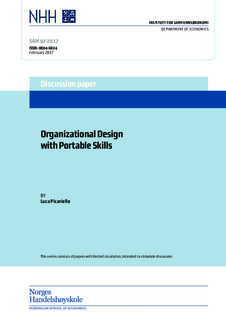| dc.contributor.author | Picariello, Luca | |
| dc.date.accessioned | 2017-02-24T11:32:27Z | |
| dc.date.available | 2017-02-24T11:32:27Z | |
| dc.date.issued | 2017-02 | |
| dc.identifier.issn | 0804-6824 | |
| dc.identifier.uri | http://hdl.handle.net/11250/2432031 | |
| dc.description.abstract | Workers can move across firms and take with them portable skills. This has an impact on how firms are organized and allocate tasks across workers. To reduce mobility, a profit maximizing firm may inefficiently allocate talented workers on tasks that reduce their outside option. In the existing literature, asymmetric information about
workers' talents makes this retention strategy profitable, although inefficient. In this paper we let workers' skills be observable across firms, but task allocation to be noncontractible. Ineefficient assignment of tasks to workers persists in this environment. We show that by organizing a firm as an equity-partnership, in which the total profit is shared, the efficient task allocation can be implemented and profit increased. This result is attained through shifting control rights to workers that become partners and decide over task allocation. Both partners and workers are retained in equilibrium.This paper provides a new rationale for the widespread presence of partnerships in human-capital intensive industries. | nb_NO |
| dc.language.iso | eng | nb_NO |
| dc.publisher | Institutt for samfunnsøkonomi, NHH | nb_NO |
| dc.relation.ispartofseries | DP SAM;02 | |
| dc.subject | Task Allocation, Retention, Compensation Contracts, Partnerships. | nb_NO |
| dc.title | Organizational Design with Portable Skills | nb_NO |
| dc.type | Working paper | nb_NO |
| dc.subject.nsi | VDP::Samfunnsvitenskap: 200::Økonomi: 210 | nb_NO |
| dc.source.pagenumber | 40 | nb_NO |
